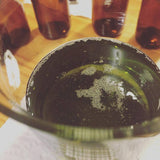
I sourced these flowers last fall. Although I had been happy with my previous calendula flower supplier (a USDA certified organic source), I didn't like that the flowers were being shipped from the other side of the country. In an emergency, I purchased a small amount of these naturally grown* calendula flowers from a local farm, in New Hampshire, just a few hours from where I'm located. I was so happy with them, I turned my my temporary fix into a permanent change. They're a higher quality, they're local, and even though they aren't USDA certified organic, they're still naturally grown.
If I was a USDA certified organic company, I would not have been able to make the switch. I would not have had the choice.
I support USDA certified organic products, both in business and in my personal life. If given a choice of two similar products from a similar location, I will almost always choose organic, even if it's more expensive. But sometimes the choice is not as clear. What if it's a certified organic imported product vs. a local conventional product? Or a USDA certified organic product from a big box company vs a naturally grown from an indie company? Or a conventional product in sustainable packaging vs. a USDA certified organic product in disposable/non-recyclable packaging?
 I like having choices. When purchasing ingredients for Wunder Budder, I like being able to look at each ingredient individually and decide based on both highest quality and eco-responsibility. I want to make the best choice each time, not just make one choice for all items.
I like having choices. When purchasing ingredients for Wunder Budder, I like being able to look at each ingredient individually and decide based on both highest quality and eco-responsibility. I want to make the best choice each time, not just make one choice for all items.
Sometimes the best choice is the organic choice, like the beautiful organic grape seed oil we switched to last year. And sometimes the best choice is a local product, like the new calendula we use. Having that choice is the most important thing.
XoXo,
Lisa
*naturally grown - grown organically, but not USDA certified organic

